| |
Auction Sell of Jabby Crombac's legend cars
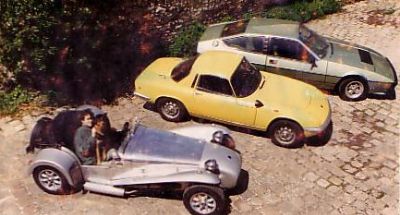
The sale
shall be organized by Artcurial on Dec.13th at 8 p.m. in the
Palais des Congrès, Porte Maillot in Paris.
POST SCRIPTUM
All three cars have been sold. After a telephone duel with
another UK resident, the Elan went to Peter Windsor, the well-known
journalist from F1 Racing, a tremendous fan of Jimmy Clark, whom he met
when he was racing the Tasman series.
The Seven was bought by a Paris barrister and Chapman’s Eclat
went to an enthusiastic dealer in the North of France. Obviously, he
will resell it later, but meantime he did enjoy it so much on its way
back to base that he intends to drive it himself for a while.
Suffering from declining eye-sight I am dreading the moment I shall
have to give up driving because it means I will have to leave my house
in the country and sell all my F1 books (several hundreds) records and
memorabiliae…Not for the time being, I hope…
Jimmy's Elan S3
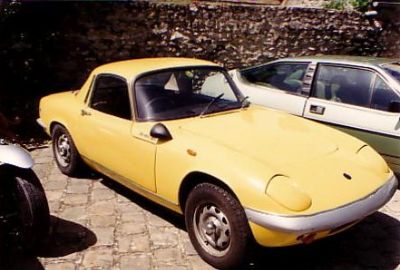 The
Ex-Jimmy Clark’s yellow Lotus Elan Coupe S3 S/E was his
company car in 67 up to his death when he was living in Paris, sharing
a flat with Jabby Crombac. Hence the left hand drive. At the end of
March 68, he entered the F2 race in Hockenheim and decided to fly his
Piper twin-Comanche to Frankfurt. He was then allowed back in UK, so,
after the race he planned to fly direct to Scotland to introduce his
lovely girl friend Kate to his parents. He wasn’t therefore
returning to Paris for a while. It had been decided that his next car
would be the new Elan+2 and he had one in order for delivery at the end
of April. The S3 was going to be taken over by Crombac, whose own S2
was very tired. “I don’t need the S3 any more and
therefore you should take it away right now” he said to
Crombac. So he drove him to Toussus le Noble general aviation airport,
got out of the car, picked up his bag and dropped it into the Comanche.
“This is your car now” he said, handing him the
keys, and disappeared… For ever. The
Ex-Jimmy Clark’s yellow Lotus Elan Coupe S3 S/E was his
company car in 67 up to his death when he was living in Paris, sharing
a flat with Jabby Crombac. Hence the left hand drive. At the end of
March 68, he entered the F2 race in Hockenheim and decided to fly his
Piper twin-Comanche to Frankfurt. He was then allowed back in UK, so,
after the race he planned to fly direct to Scotland to introduce his
lovely girl friend Kate to his parents. He wasn’t therefore
returning to Paris for a while. It had been decided that his next car
would be the new Elan+2 and he had one in order for delivery at the end
of April. The S3 was going to be taken over by Crombac, whose own S2
was very tired. “I don’t need the S3 any more and
therefore you should take it away right now” he said to
Crombac. So he drove him to Toussus le Noble general aviation airport,
got out of the car, picked up his bag and dropped it into the Comanche.
“This is your car now” he said, handing him the
keys, and disappeared… For ever.
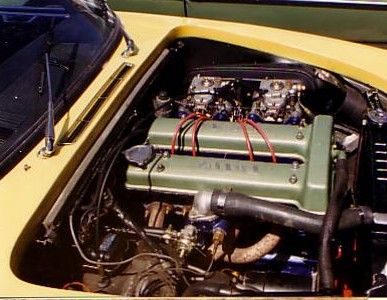 Import
duties were paid and the car was duly licensed on French plates and
Crombac did use it for many years. It did visit most European GP
circuits. After a few years it had reached some 55000 miles and was
retired. In 1989, Crombac decided to restore it completely and, very
kindly, Mike Kimberley, then President of Lotus, offered all the
wearing parts: bearing shells, pistons, valves, bearings, bushes,
dampers etc. etc. Should a new chassis be fitted ? Crombac organized an
“Ethical committee” with Peter Warr, the principal
of Team Lotus and the famous journalist Dennis Jenkinson, it was
decided that Jimmy’s chassis should remain in place. The
engine was prepared by Ateliers Sport-Auto, in a Paris suburb, a
specialist of Ford race engines preparation. When completed, the car
was driven for finishing to the great British specialist Peter Day of
Daytune in Cambridge. Peter’s instructions were to prepare it
“as if Jimmy had just stepped out of it”
Accordingly, for instance, when the inside upholstery had turned maroon
colour, instead of changing it, he dyed it back to the original black
colour. When finished, the car was driven to Lotus cars where a party
was given in its honour. The foitter who had assembled it in 1967 was
present and he remarked: “the doors aren’t fitting
any better” The whole trip was recorded in Classic and Sports
cars of November 1995. The S3 then resumed frequent use –but
not daily one…It is a lively small and very nimble car with
traditional Lotus steering and road –holding. Import
duties were paid and the car was duly licensed on French plates and
Crombac did use it for many years. It did visit most European GP
circuits. After a few years it had reached some 55000 miles and was
retired. In 1989, Crombac decided to restore it completely and, very
kindly, Mike Kimberley, then President of Lotus, offered all the
wearing parts: bearing shells, pistons, valves, bearings, bushes,
dampers etc. etc. Should a new chassis be fitted ? Crombac organized an
“Ethical committee” with Peter Warr, the principal
of Team Lotus and the famous journalist Dennis Jenkinson, it was
decided that Jimmy’s chassis should remain in place. The
engine was prepared by Ateliers Sport-Auto, in a Paris suburb, a
specialist of Ford race engines preparation. When completed, the car
was driven for finishing to the great British specialist Peter Day of
Daytune in Cambridge. Peter’s instructions were to prepare it
“as if Jimmy had just stepped out of it”
Accordingly, for instance, when the inside upholstery had turned maroon
colour, instead of changing it, he dyed it back to the original black
colour. When finished, the car was driven to Lotus cars where a party
was given in its honour. The foitter who had assembled it in 1967 was
present and he remarked: “the doors aren’t fitting
any better” The whole trip was recorded in Classic and Sports
cars of November 1995. The S3 then resumed frequent use –but
not daily one…It is a lively small and very nimble car with
traditional Lotus steering and road –holding.
Colin Chapman's Eclat 2,2
 Hearing that Crombac had been sacked by FIA
President Balestre from the FISA’s Technical Commission for
having supported Colin Chapman’s claim that the twin-Chassis
Lotus 88 F1 didn’t contravene the Technical regulation
Chapman and his sponsor David Thieme of Essex Motor Sport invited
Crombac for dinner at the famous Rampoldi restaurant in Monaco on the
eve of the 81 Grand Prix and Chapman fished into his pocket and
produced a set of keys: “Here is my own car, this is the
least I can do for you” he said. Crombac was delighted but
surprised to see he was holding a set of keys for a Cessna twin-engined
pressurized aircraft! The car was officially handed to him at the
British Grand Prix and Essex Motorsport took care of Custom duties and
licensing in France, temporarily in the name of its chauffeur. It was
used regularly since. It is right-hand drive. The colour is metallic
green. It has traditional Lotus road-holding. Its five-speed Getrag
gearbox make it ideally suited to motorway cruising. Hearing that Crombac had been sacked by FIA
President Balestre from the FISA’s Technical Commission for
having supported Colin Chapman’s claim that the twin-Chassis
Lotus 88 F1 didn’t contravene the Technical regulation
Chapman and his sponsor David Thieme of Essex Motor Sport invited
Crombac for dinner at the famous Rampoldi restaurant in Monaco on the
eve of the 81 Grand Prix and Chapman fished into his pocket and
produced a set of keys: “Here is my own car, this is the
least I can do for you” he said. Crombac was delighted but
surprised to see he was holding a set of keys for a Cessna twin-engined
pressurized aircraft! The car was officially handed to him at the
British Grand Prix and Essex Motorsport took care of Custom duties and
licensing in France, temporarily in the name of its chauffeur. It was
used regularly since. It is right-hand drive. The colour is metallic
green. It has traditional Lotus road-holding. Its five-speed Getrag
gearbox make it ideally suited to motorway cruising.
Seven S3
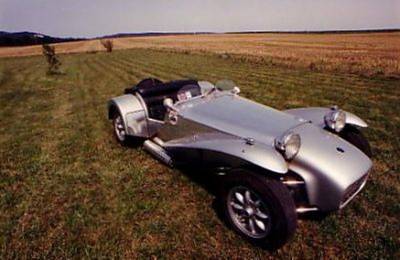 This is an
original right-hand drive Seven Series 3 with a Ford cross-flow 1600cm3
engine which has been assembled by its first owner in the U.K. But he
then emigrated to Australia and put it up for sale. In 1975, having
sold his Hispano-Suiza to buy a bigger boat Crombac had a surplus of
money and he was keen to buy a Seven. He went to visit Graham Nearn of
Caterham cars, the Seven specialist. He was accompanied by Peter Warr,
who was running Lotus Components at the time the S3 were built. This
prompted Nearn to say “No, I have no car available at the
tine but when a suitable one turns up, we shall prepare it for
you.” A little later he called to say he had the S3 for sale
and Crombac went and picked it up. He did use it for a while.
It went for instance to the 24 Hours of Le Mans in 1975. This is an
original right-hand drive Seven Series 3 with a Ford cross-flow 1600cm3
engine which has been assembled by its first owner in the U.K. But he
then emigrated to Australia and put it up for sale. In 1975, having
sold his Hispano-Suiza to buy a bigger boat Crombac had a surplus of
money and he was keen to buy a Seven. He went to visit Graham Nearn of
Caterham cars, the Seven specialist. He was accompanied by Peter Warr,
who was running Lotus Components at the time the S3 were built. This
prompted Nearn to say “No, I have no car available at the
tine but when a suitable one turns up, we shall prepare it for
you.” A little later he called to say he had the S3 for sale
and Crombac went and picked it up. He did use it for a while.
It went for instance to the 24 Hours of Le Mans in 1975.
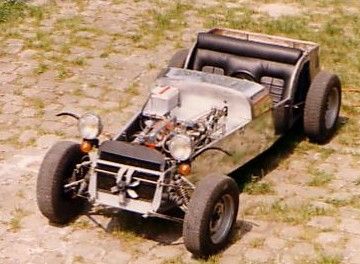 One day
the speedo packed up and Crombac decided it was time to restore it. He
put a note in the gossip column of his magazine Sport-Auto, asking for
some help and a reader, Fabrice Dupré did turn up
and actually did the job himself. The yellow paint was removed and the
body-shell polished. The seats and dashboard were upholstered in black
Connolly leather, the windscreen was replaced by two aero-screens.
Light alloy wheels were fitted Lots of parts were changed and they were
regularly delivered to Crombac by Team Lotus transporters on their way
to European GPs As far as the engine was concerned, it was fitted with
two twin-choke Weber DCOE a bunch of bananas exhaust and a Cosworth A2
camshaft presented to Crombac by Keith Duckworth, the chairman of
Cosworth. It was used regularly afterwards, but Crombac
wasn’t too found of the fibreglass body parts: nose-cone and
four wings so he took the car to England and the son of the famous
coachbuilder Maurice Gomm (where the monocoque of the first Tyrrell
F1was made) made them in polished light alloy. One day
the speedo packed up and Crombac decided it was time to restore it. He
put a note in the gossip column of his magazine Sport-Auto, asking for
some help and a reader, Fabrice Dupré did turn up
and actually did the job himself. The yellow paint was removed and the
body-shell polished. The seats and dashboard were upholstered in black
Connolly leather, the windscreen was replaced by two aero-screens.
Light alloy wheels were fitted Lots of parts were changed and they were
regularly delivered to Crombac by Team Lotus transporters on their way
to European GPs As far as the engine was concerned, it was fitted with
two twin-choke Weber DCOE a bunch of bananas exhaust and a Cosworth A2
camshaft presented to Crombac by Keith Duckworth, the chairman of
Cosworth. It was used regularly afterwards, but Crombac
wasn’t too found of the fibreglass body parts: nose-cone and
four wings so he took the car to England and the son of the famous
coachbuilder Maurice Gomm (where the monocoque of the first Tyrrell
F1was made) made them in polished light alloy.
Technical details are available in the catalogue of the sale at
Artcurial.
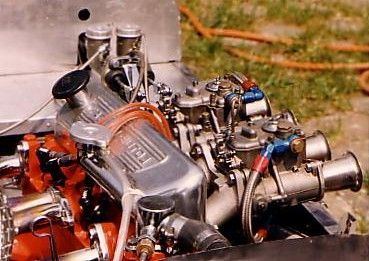
|











 Import
duties were paid and the car was duly licensed on French plates and
Crombac did use it for many years. It did visit most European GP
circuits. After a few years it had reached some 55000 miles and was
retired. In 1989, Crombac decided to restore it completely and, very
kindly, Mike Kimberley, then President of Lotus, offered all the
wearing parts: bearing shells, pistons, valves, bearings, bushes,
dampers etc. etc. Should a new chassis be fitted ? Crombac organized an
“Ethical committee” with Peter Warr, the principal
of Team Lotus and the famous journalist Dennis Jenkinson, it was
decided that Jimmy’s chassis should remain in place. The
engine was prepared by Ateliers Sport-Auto, in a Paris suburb, a
specialist of Ford race engines preparation. When completed, the car
was driven for finishing to the great British specialist Peter Day of
Daytune in Cambridge. Peter’s instructions were to prepare it
“as if Jimmy had just stepped out of it”
Accordingly, for instance, when the inside upholstery had turned maroon
colour, instead of changing it, he dyed it back to the original black
colour. When finished, the car was driven to Lotus cars where a party
was given in its honour. The foitter who had assembled it in 1967 was
present and he remarked: “the doors aren’t fitting
any better” The whole trip was recorded in Classic and Sports
cars of November 1995. The S3 then resumed frequent use –but
not daily one…It is a lively small and very nimble car with
traditional Lotus steering and road –holding.
Import
duties were paid and the car was duly licensed on French plates and
Crombac did use it for many years. It did visit most European GP
circuits. After a few years it had reached some 55000 miles and was
retired. In 1989, Crombac decided to restore it completely and, very
kindly, Mike Kimberley, then President of Lotus, offered all the
wearing parts: bearing shells, pistons, valves, bearings, bushes,
dampers etc. etc. Should a new chassis be fitted ? Crombac organized an
“Ethical committee” with Peter Warr, the principal
of Team Lotus and the famous journalist Dennis Jenkinson, it was
decided that Jimmy’s chassis should remain in place. The
engine was prepared by Ateliers Sport-Auto, in a Paris suburb, a
specialist of Ford race engines preparation. When completed, the car
was driven for finishing to the great British specialist Peter Day of
Daytune in Cambridge. Peter’s instructions were to prepare it
“as if Jimmy had just stepped out of it”
Accordingly, for instance, when the inside upholstery had turned maroon
colour, instead of changing it, he dyed it back to the original black
colour. When finished, the car was driven to Lotus cars where a party
was given in its honour. The foitter who had assembled it in 1967 was
present and he remarked: “the doors aren’t fitting
any better” The whole trip was recorded in Classic and Sports
cars of November 1995. The S3 then resumed frequent use –but
not daily one…It is a lively small and very nimble car with
traditional Lotus steering and road –holding. Hearing that Crombac had been sacked by FIA
President Balestre from the FISA’s Technical Commission for
having supported Colin Chapman’s claim that the twin-Chassis
Lotus 88 F1 didn’t contravene the Technical regulation
Chapman and his sponsor David Thieme of Essex Motor Sport invited
Crombac for dinner at the famous Rampoldi restaurant in Monaco on the
eve of the 81 Grand Prix and Chapman fished into his pocket and
produced a set of keys: “Here is my own car, this is the
least I can do for you” he said. Crombac was delighted but
surprised to see he was holding a set of keys for a Cessna twin-engined
pressurized aircraft! The car was officially handed to him at the
British Grand Prix and Essex Motorsport took care of Custom duties and
licensing in France, temporarily in the name of its chauffeur. It was
used regularly since. It is right-hand drive. The colour is metallic
green. It has traditional Lotus road-holding. Its five-speed Getrag
gearbox make it ideally suited to motorway cruising.
Hearing that Crombac had been sacked by FIA
President Balestre from the FISA’s Technical Commission for
having supported Colin Chapman’s claim that the twin-Chassis
Lotus 88 F1 didn’t contravene the Technical regulation
Chapman and his sponsor David Thieme of Essex Motor Sport invited
Crombac for dinner at the famous Rampoldi restaurant in Monaco on the
eve of the 81 Grand Prix and Chapman fished into his pocket and
produced a set of keys: “Here is my own car, this is the
least I can do for you” he said. Crombac was delighted but
surprised to see he was holding a set of keys for a Cessna twin-engined
pressurized aircraft! The car was officially handed to him at the
British Grand Prix and Essex Motorsport took care of Custom duties and
licensing in France, temporarily in the name of its chauffeur. It was
used regularly since. It is right-hand drive. The colour is metallic
green. It has traditional Lotus road-holding. Its five-speed Getrag
gearbox make it ideally suited to motorway cruising.  One day
the speedo packed up and Crombac decided it was time to restore it. He
put a note in the gossip column of his magazine Sport-Auto, asking for
some help and a reader, Fabrice Dupré did turn up
and actually did the job himself. The yellow paint was removed and the
body-shell polished. The seats and dashboard were upholstered in black
Connolly leather, the windscreen was replaced by two aero-screens.
Light alloy wheels were fitted Lots of parts were changed and they were
regularly delivered to Crombac by Team Lotus transporters on their way
to European GPs As far as the engine was concerned, it was fitted with
two twin-choke Weber DCOE a bunch of bananas exhaust and a Cosworth A2
camshaft presented to Crombac by Keith Duckworth, the chairman of
Cosworth. It was used regularly afterwards, but Crombac
wasn’t too found of the fibreglass body parts: nose-cone and
four wings so he took the car to England and the son of the famous
coachbuilder Maurice Gomm (where the monocoque of the first Tyrrell
F1was made) made them in polished light alloy.
One day
the speedo packed up and Crombac decided it was time to restore it. He
put a note in the gossip column of his magazine Sport-Auto, asking for
some help and a reader, Fabrice Dupré did turn up
and actually did the job himself. The yellow paint was removed and the
body-shell polished. The seats and dashboard were upholstered in black
Connolly leather, the windscreen was replaced by two aero-screens.
Light alloy wheels were fitted Lots of parts were changed and they were
regularly delivered to Crombac by Team Lotus transporters on their way
to European GPs As far as the engine was concerned, it was fitted with
two twin-choke Weber DCOE a bunch of bananas exhaust and a Cosworth A2
camshaft presented to Crombac by Keith Duckworth, the chairman of
Cosworth. It was used regularly afterwards, but Crombac
wasn’t too found of the fibreglass body parts: nose-cone and
four wings so he took the car to England and the son of the famous
coachbuilder Maurice Gomm (where the monocoque of the first Tyrrell
F1was made) made them in polished light alloy.